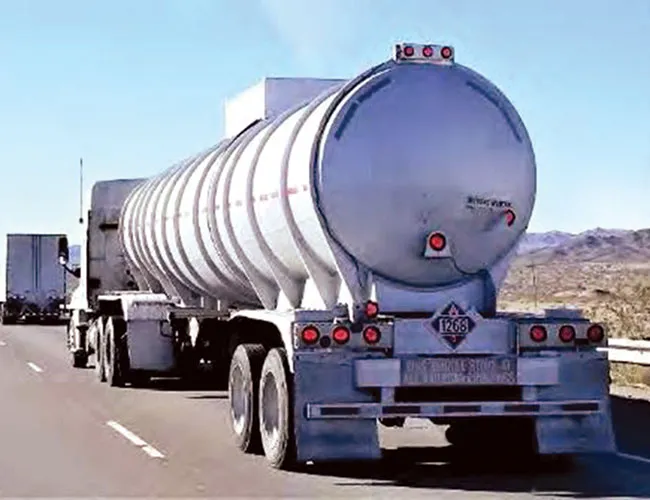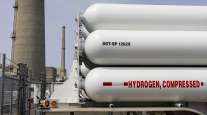Staff Reporter
Canada, Colorado Form Hydrogen Development Partnership

A hydrogen fuel tank truck on a Canadian highway. The Colorado governor’s office said Alberta “has the resources and expertise needed to become a major global supplier.” (Hydrogen Strategy for Canada)
[Stay on top of transportation news: Get TTNews in your inbox.]
Forming a pact with Canada’s largest hydrogen producer, Colorado Gov. Jared Polis and Alberta province’s premier, Danielle Smith, signed a memorandum of understanding to help the state reach its 100% carbon-free emissions goal by 2040.
“Colorado and Alberta are leading in clean energy, and emission reduction is a global challenge that requires exactly this kind of international cooperation,” Polis announced Jan. 31. “I am excited that Colorado and Alberta are partnering together to do even greater things.”
The governor’s office declared that Alberta, Canada’s largest hydrogen producer, “has the resources and expertise needed to become a major global supplier.”
Alberta has the potential to tap into 388,500 megawatts of thermal energy there working through existing technical, structural and ecologic restrictions, according to the Canadian Geothermal Energy Association, an Alberta-based nonprofit.
Smith said both the province and Colorado will build upon their shared legacies in environmental leadership and energy development to transition away from using energy with carbon emissions.
“This agreement will help us deliver solutions and support innovation in clean and renewable energy while providing new economic opportunities for Alberta companies,” Smith said.

Polis and Smith
The agreement calls for both parties to align and improve regulation and increase collaboration. They also plan to share more information about best practices in carbon capture (including use and storage), reducing methane emissions and developing hydrogen energy.
“Sharing our expertise and experience will enhance our environmental stewardship as we responsibly build out and broaden our energy sources to meet the needs of today and the future,” said Julie Murphy, director of the Colorado Energy and Carbon Management Commission. “This partnership, through formal conferences or summits and informal conversations sharing best practices, methodologies and mapping allows ECMC and Alberta to build on what we have individually learned and accelerate our collective understandings.”
The agreement lasts for three years and is able to be renewed. Bilateral trade between Alberta and Colorado amounted to $6.2 billion in 2022.
In 2020, the Canadian government’s department of natural resources issued a report called “Hydrogen Strategy for Canada” that highlighted its leading role as a potential source for hydrogen since it is “rich in the feedstocks that produce hydrogen.”
How does hydrogen fuel cell technology fit into freight transportation? Find out with Parker Meeks, the CEO of Hyzon, a company that designs and manufactures fuel cell technology for heavy-duty transport applications. Tune in above or by going to RoadSigns.ttnews.com.
The report noted that gaseous hydrogen in Canada is mostly transported in steel tube trailer trucks, but weight regulations limit how much a truck can deliver.
“A number of companies are developing 450 bar hydrogen storage delivery systems using composite materials to increase the amount of hydrogen that can be delivered by each truck, thereby reducing costs and transportation emissions,” the report added. “Cryogenic liquid hydrogen is transported in liquid super-insulated, cryogenic tanker trucks. For hydrogen distribution at longer distances in moderate amounts where dedicated hydrogen pipelines are not an option, liquefied hydrogen is currently the most economical distribution method due to its significantly higher energy density.”
Hydrogen also can be transported and stored in natural gas pipelines. “Canada has one of the world’s largest pipeline networks delivering natural gas from production areas to markets in both Canada and the U.S.,” the study noted.
Canada produces 3 million metric tons of hydrogen annually for industrial use, according to Clean Energy Canada at Simon Fraser University in Vancouver.
Want more news? Listen to today's daily briefing below or go here for more info:





